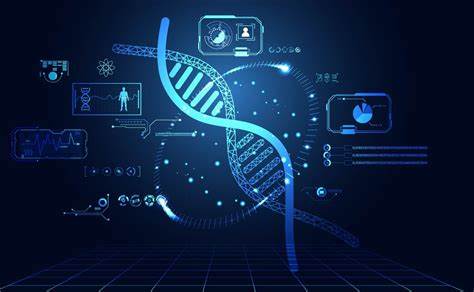Understanding AI in Genomics
The Basics of Genomics
Genomics is the study of the complete set of DNA (the genome) in a person or organism. It involves the analysis of the structure, function, evolution, and mapping of genomes. The human genome consists of approximately 3 billion DNA base pairs, and understanding this complex blueprint is crucial for diagnosing, treating, and preventing diseases.The Role of AI in Genomics
AI, particularly machine learning (ML) and deep learning (DL), plays a pivotal role in analyzing vast genomic datasets. These technologies can identify patterns and correlations within the data that are beyond human capability. By processing and interpreting genetic information at an unprecedented scale and speed, AI is revolutionizing genomics research and clinical applications.Applications of AI in Genomics
Personalized Medicine
One of the most significant applications of AI in genomics is in the field of personalized or precision medicine. By analyzing a patient’s genetic makeup, AI algorithms can predict the risk of diseases, recommend preventive measures, and tailor treatments to individual genetic profiles. This approach ensures that patients receive the most effective therapies with minimal side effects.Drug Discovery and Development
AI-driven genomics is accelerating the drug discovery process by identifying potential drug targets and predicting drug responses based on genetic variations. This not only speeds up the development of new medications but also reduces the cost and time involved in bringing new drugs to market.Early Disease Detection and Diagnosis
AI algorithms can analyze genomic data to detect early signs of diseases, even before symptoms appear. For instance, AI can identify genetic markers associated with cancers, allowing for early intervention and better prognosis. This early detection is crucial for diseases like cancer, where early treatment can significantly improve outcomes.Rare Disease Identification
AI in genomics is particularly beneficial for diagnosing rare genetic disorders. These conditions often go undiagnosed due to their rarity and complexity. AI can analyze genomic data to identify mutations and variations associated with rare diseases, leading to accurate and timely diagnoses.Genetic Counseling
AI-powered tools can assist genetic counselors by providing insights into a patient’s genetic data. These tools can predict the likelihood of inherited conditions and help patients understand their genetic risks, enabling informed decision-making regarding family planning and healthcare.Key Technologies Driving AI in Genomics
Machine Learning
Machine learning algorithms can process and analyze large genomic datasets to identify patterns and make predictions. Supervised learning, unsupervised learning, and reinforcement learning are some of the techniques used in genomic data analysis.Deep Learning
Deep learning, a subset of machine learning, uses neural networks with multiple layers to analyze complex genomic data. This technology excels in recognizing intricate patterns in large datasets, making it ideal for genomic research.Natural Language Processing (NLP)
NLP enables AI systems to understand and interpret human language. In genomics, NLP is used to extract meaningful information from scientific literature, clinical notes, and medical records, aiding in the identification of genetic markers and disease associations.AI Medical Chatbots
AI medical chatbots are emerging as valuable tools in genomics and precision medicine. These chatbots can interact with patients, collect medical history, and provide personalized health recommendations based on genetic information. They enhance patient engagement and streamline the healthcare experience.Challenges and Ethical Considerations
Data Privacy and Security
Genomic data is highly sensitive, and ensuring its privacy and security is paramount. There are concerns about data breaches and the misuse of genetic information. Robust encryption methods, secure data storage, and stringent access controls are essential to protect patient data.Ethical Issues in Genetic Data Use
The use of genetic data raises ethical questions regarding consent, ownership, and the potential for genetic discrimination. It is crucial to establish ethical guidelines and regulatory frameworks to govern the use of genetic information and ensure it is used responsibly.Accuracy and Bias in AI Algorithms
AI algorithms must be accurate and free from bias to provide reliable genomic insights. Bias in training data can lead to skewed results and disparities in healthcare. Continuous monitoring, validation, and updating of AI models are necessary to maintain their accuracy and fairness.Integration with Clinical Practice
Integrating AI-driven genomics into clinical practice poses logistical and technical challenges. Healthcare providers need training to interpret genomic data and integrate AI tools into their workflows. Collaborative efforts between AI experts, geneticists, and clinicians are essential for successful implementation.Case Studies and Success Stories
AI in Cancer Genomics
AI has shown remarkable success in cancer genomics. For instance, IBM Watson for Genomics uses AI to analyze genomic data and recommend personalized cancer treatments. By identifying specific genetic mutations, the system helps oncologists tailor therapies to each patient’s unique genetic profile, improving treatment outcomes.AI in Cardiovascular Disease Prediction
Researchers have developed AI models that predict cardiovascular disease risk based on genomic data. These models analyze genetic variants associated with heart disease and provide personalized risk assessments, enabling early intervention and preventive measures.AI in Rare Disease Diagnosis
AI platforms like Face2Gene use facial recognition and genomic data to diagnose rare genetic disorders. The system analyzes facial features and genetic markers to identify syndromes, aiding in the diagnosis of conditions that are often difficult to detect.AI-Powered Genetic Counseling
AI tools are enhancing genetic counseling services. For example, the Counsyl platform uses AI to analyze genetic data and generate reports for genetic counselors. This helps counselors provide accurate risk assessments and personalized advice to patients.The Future of AI in Genomics
Advances in AI Algorithms
As AI algorithms continue to evolve, they will become even more adept at analyzing complex genomic data. Future advancements may include more sophisticated deep learning models, improved natural language processing capabilities, and enhanced data integration techniques.Expansion of Genomic Databases
The growth of genomic databases will provide AI systems with more comprehensive datasets to analyze. Collaborative efforts to share genomic data across institutions and countries will accelerate research and lead to more accurate insights.Integration with Other Omics Technologies
Integrating genomics with other omics technologies, such as proteomics and metabolomics, will provide a more holistic understanding of human biology. AI can analyze multi-omics data to uncover intricate biological pathways and develop more precise treatments.Personalized Preventive Medicine
AI in genomics will play a crucial role in preventive medicine. By analyzing genetic predispositions, AI can identify individuals at risk of certain diseases and recommend lifestyle changes, preventive measures, and early interventions to mitigate those risks.Ethical and Regulatory Frameworks
The future of AI in genomics will require robust ethical and regulatory frameworks to ensure the responsible use of genetic data. Policymakers, ethicists, and researchers must collaborate to develop guidelines that protect patient privacy, ensure data security, and prevent misuse of genetic information.Conclusion
The integration of AI in genomics is transforming the landscape of precision medicine, offering unprecedented opportunities for personalized healthcare. By analyzing vast amounts of genetic data, AI algorithms can predict disease risks, tailor treatments, accelerate drug discovery, and enhance genetic counseling. However, the use of AI in genomics also raises important ethical and technical challenges that must be addressed to ensure its responsible and equitable application. As technology continues to advance, AI-driven genomics will undoubtedly play a pivotal role in shaping the future of medicine, bringing us closer to a world where healthcare is truly personalized and predictive. By embracing the potential of AI in genomics, we can unlock new frontiers in precision medicine, improving patient outcomes and revolutionizing healthcare as we know it. The journey is just beginning, and the possibilities are boundless.Visited 5 times, 1 visit(s) today
[mc4wp_form id="5878"]











